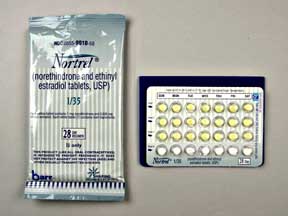Nortrel 1/35 (28) is a limited distribution medication.

Nortrel 1/35 (28) Coupons & Savings Card – Discount Prices from $10.82
My prescription
Edit
1-35MG-MCG, Nortrel 1/35 (28) (28 Tablets)
Select pharmacy

CVS
$20.40
COUPON PRICE
Walmart
$10.82
COUPON PRICE
Walgreens
$12.27
COUPON PRICE
Albertsons
$13.26
COUPON PRICENortrel 1/35 (28) savings card
Show this card to your pharmacist
Walmart
$10.82
BIN
ID
PCN
GRP
019876
LHCB3F19E5
CHIPPO
LHX
Powered by
Price history for Nortrel 1/35 (28)
28 Tablets, 1-35MG-MCG
Average retail price for Nortrel 1/35 (28)
Average SaveHealth price for Nortrel 1/35 (28)
Our price history data is based on aggregated prescription data collected from participating pharmacies in America. Our prescription data updates daily to reflect the latest price changes. If you notice a missing data point, it means there wasn't sufficient data available to generate a monetary value for that date.
*Retail prices are based on pharmacy claims data, and may not be accurate when we don't have enough claims.
Nortrel 1/35 (28) dosage forms
Dosage Quantity Price from Per unit 1-35MG-MCG 28 Tablets $10.82 $0.39 1-35MG-MCG 168 Tablets $38.90 $0.23
| Dosage | Quantity | Price from | Per unit |
|---|---|---|---|
| 1-35MG-MCG | 28 Tablets | $10.82 | $0.39 |
| 1-35MG-MCG | 168 Tablets | $38.90 | $0.23 |
What kind of birth control pill is nortrel?
Nortrel is a combination oral contraceptive pill that contains both estrogen and progestin. It is used to prevent pregnancy by inhibiting ovulation, altering the cervical mucus, and changing the uterine lining to prevent fertilization and implantation.
Does nortrel help with acne?
Yes, Nortrel, which is a combination oral contraceptive, can help improve acne in some individuals. The hormones in Nortrel can reduce the production of androgens, which in turn decreases the amount of oil produced by the skin, potentially leading to clearer skin. However, the effectiveness can vary from person to person, and it is important to consult with a healthcare provider to determine if it is an appropriate treatment for acne in a specific case.
What are the ingredients in Nortrel 1 35 tablets 28?
Nortrel 1/35 tablets contain the active ingredients norethindrone and ethinyl estradiol. The inactive ingredients may include lactose anhydrous, magnesium stearate, microcrystalline cellulose, and other excipients that help form the tablet. It's important to check the packaging or consult a pharmacist for a complete list of inactive ingredients, as formulations can vary.
What birth control is similar to nortrel?
Nortrel is a combination oral contraceptive that contains ethinyl estradiol and norethindrone. Birth control pills that are similar to Nortrel would also contain these two active ingredients. Some examples include Ortho-Novum, Necon, and Loestrin. It is important for individuals to consult with their healthcare provider to determine the most suitable option for their needs.
Does nortrel 1,35 have estrogen?
Yes, Nortrel 1/35 contains estrogen. It is a combination oral contraceptive that includes both estrogen and progestin. The estrogen component in Nortrel 1/35 is ethinyl estradiol.
